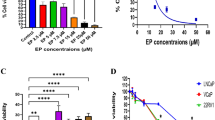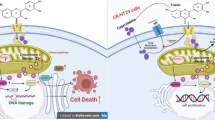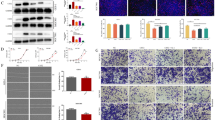Summary
This study examined the synergetic effect of class IA Phosphoinositide 3-kinases catalytic subunit p110β knockdown in conjunction with oxaliplatin treatment on colon cancer cells. Down-regulation of p110β by siRNA interference and oxaliplatin treatment were applied in colon cancer cell lines HT29, SW620 and HCT116. MTT assay was used to measure the inhibitory effect of p110β knockdown on the proliferation of colon cancer cell lines. SubG1 assay and Annexin-V FITC/PI double-labeling cytometry were applied to detect cell apoptosis. And cell cycle was evaluated by using PI staining and flow cytometry. The expression of caspase 3, cleaved PARP, p-Akt, T-Akt and p110β was determined by western blotting. The results suggested that down-regulation of p110β expression by siRNA obviously reduced cell number via accumulation in G0-G1 phase of the cell cycle in the absence of notablely increased apoptosis in colon cancer cell lines HT29 and SW620 (S phase arrest in HCT116). Moreover, inhibition of p110β expression increased oxaliplatin-induced cell apoptosis and cell cycle arrest in HT29, HCT116 and SW620 cell lines. In addition, increases of cleaved caspase-3 and cleaved PARP induced by oxaliplatin treatment were determined by immunoblotting in p110β knockdown group compared with normal control group and wild-type group. It is concluded that down-regulated expression of p110β could inhibit colon cancer cells proliferation and result in increased chemosensitivity of colorectal cancer cells to oxaliplatin through augmentation of oxaliplatin-induced cell apoptosis and cell cycle arrest.
Similar content being viewed by others
References
Koyasu, S. The role of PI3K in immune cells. Nat Immunol, 2003,4(4):313–319
Myou S, Leff AR, Myo S, et al. Blockade of inflammation and airway hyperresponsiveness in immune-sensitized mice by dominant-negative phosphoinositide 3-kinase-TAT. J Exp Med, 2003,198(10):1573–1582
Fruman DA, Snapper SB, Yballe CM, et al. Impaired B cell development and proliferation in absence of phosphoinositide 3-kinase p85 alpha. Science, 1999,283(5400):393–397
Okkenhaug K, Vanhaesebroeck B. PI3K in lymphocyte development, differentiation and activation. Nature Rev Immunol, 2003,3(4):317–330
Jia SD, Liu ZN, Zhang S, et al. Essential roles of PI(3)K-p110b in cell growth, metabolism and tumorigenesis. Nature, 2008,454(7205):776–779
Muller CI, Miller CW, Hofmann WK, et al. Rare mutations of the PIK3CA gene in malignancies of the hematopoietic system as well as endometrium, ovary, prostate and osteosarcomas, and discovery of a PIK3CA pseudogene. Leuk Res, 2007,31(1):27–32
Gymnopoulos M, Elsliger MA, Vogt PK. Rare cancer-specific mutations in PIK3CA show gain of function. PNAS, 2007,104(13):5569–5574
Ma YY, Wei SJ, Lin YC, et al. PIK3CA as an oncogene in cervical cancer. Oncogene, 2000,19(23):2739–2744
Samuels Y, Wang Z, Bardelli A, et al. High frequency of mutations of the PIK3CA gene in human cancers. Science, 2004,304(5670):554
Shayesteh L, Lu Y, Kuo WL, et al. PIK 3CA is implicated as an oncogene in ovarian cancer, Nat Genet, 1999,21(1):99–102
Hill KM, Kalifa S, Das JR, et al. The role of PI 3-kinase p110beta in AKT signally, cell survival, and proliferation in human prostate cancer cells. Prostate, 2010,70(7):755–764
Ciraolo E, Iezzi M, Marone R, et al. Phosphoinositide 3-kinase p110β activity: key role in metabolism and mammary gland cancer but not development. Sci Signal, 2008,1(36):1–12
Carvalho S, Milanezi F, Costa JL, et al. PIKing the right isoform: the emergent role of the p110β subunit in breast cancer. Virchows Arch, 2010,456(3):235–243
Toscano F, Parmentier B, Fajoui ZE, et al. p53 dependent and independent sensitivity to oxaliplatin of colon cancer cells. Biochem Pharmacol, 2007,74(3):392–406
Cheng JQ, Lindsley CW, Cheng GZ, et al. The Akt/PKB pathway: molecular target for cancer drug discovery. Oncogene, 2005,24(50):7482–7492
Xia S, Yu S, Fu Q, et al. Inhibiting PI3K/Akt pathway increases DNA damage of cervical carcinoma HeLa cells by drug radiosensitization. J Huazhong Univ Sci Technol [Med Sci], 2010,30(3):360–364
Wu Q, Chen Y, Cui G, et al. Wortmannin inhibits K562 leukemic cells by regulating PI3k/Akt channel in vitro. J Huazhong Univ Sci Technol [Med Sci], 2009,29(4):451–456
Rudelius M, Pittaluga S, Nishizuka S, et al. Constitutive activation of Akt contributes to the pathogenesis and survival of mantle cell lymphoma. Blood, 2006,108(5):1668–1676
Leverrier Y, Okkenhaug K, Sawyer C, et al. Class I phosphoinositide 3-kinase p110beta is required for apoptotic cell and Fcgamma receptor-mediated phagocytosis by macrophages. J Biol Chem, 2003,278(40):38437–38442
Denley A, Kang S, Karst U, et al. Oncogenic signaling of class I PI3K isoforms. Oncogene, 2008,27(18):2561–2574
Matheny RW Jr, Adamo ML. PI3K p110α and p110β have differential effects on Akt activation and protection against oxidative stress-induced apoptosis in myoblasts. Cell Death Differ, 2010,17(4):677–688
Marqués M, Kumar A, Cortés I, et al. Phosphoinositide 3-kinases p110α and p110β regulate cell cycle entry, exhibiting distinct activation kinetics in G1 phase. Mol Cell Biol, 2008,28(8):2803–688
Czauderna F, Fechtner M, Aygun H, et al. Functional studies of the PI(3)-kinase signalling pathway employing synthetic and expressed shRNA. Nucleic Acids Res, 2003,31(2):670–682
Pu P, Kang C, Zhang Z, et al. Downregulation of PIK3CB by siRNA suppresses malignant glioma cell growth in vitro and in vivo. Technol Cancer Res Treat, 2006,5(3):271–280
Kumara A, Fernandez-Capetillob O, Carreraa AC. Nuclear phosphoinositide 3-kinase β controls doublestrand break DNA repair. PNAS, 2010,107(16):7491–7496
Brown EJ. Analysis of cell cycle progression and genomic integrity in early lethal knockouts. Methods Mol Biol, 2004,280:201–212
Abraham RT. Cell cycle checkpoint signaling through the ATM and ATR kinases. Genes Dev, 2001,15(17):2177–2196
Wang X, Li M, Wang J, et al. The BH3-only protein, PUMA, is involved in oxaliplatin-induced apoptosis in colon cancer cells. Biochem Pharmacol, 2006,71(11):1540–1550
Liu HF, Hu HC, Chao JI. Oxaliplatin down-regulates survivin by p38 MAP kinase and proteasome in human colon cancer cells. Chemico Biological Interactions, 2010,188(3):535–545
Hochster H, Chachoua A, Speyer J, et al. Oxaliplatin with weekly bolus fluorouracil and low-dose leucovorin as first-line therapy for patients with colorectal cancer. J Clin Oncol, 2003,21(14):2703–2707
Chaney SG, Campbell SL, Bassett E, et al. Recognition and processing of cisplatin- and oxaliplatin-DNA adducts. Crit Rev Oncol Hematol, 2005,53(1):3–11
Raymond E, Faivre S, Chaney S, et al. Cellular and molecular pharmacology of oxaliplatin. Mol. Cancer Ther, 2002,1(3):227–235
Author information
Authors and Affiliations
Corresponding author
Additional information
This work was supported by grants from National Natural Science Foundation of China (No. 81072431, 30872472, 30973496, and 30800569), a grant from Innovation Foundation of Huazhong University of Science and Technology (No. 2010MS027), grants of Foundation of Program 973 (No. 2009CB521802), and Special Fund for Central University Basic Scientific Research (No. 2011JC062, and 2011JC063).
Rights and permissions
About this article
Cite this article
Liu, W., Wang, G., Cao, X. et al. Down-regulation of p110β expression increases chemosensitivity of colon cancer cell lines to oxaliplatin. J. Huazhong Univ. Sci. Technol. [Med. Sci.] 32, 280–286 (2012). https://doi.org/10.1007/s11596-012-0049-z
Received:
Published:
Issue Date:
DOI: https://doi.org/10.1007/s11596-012-0049-z




